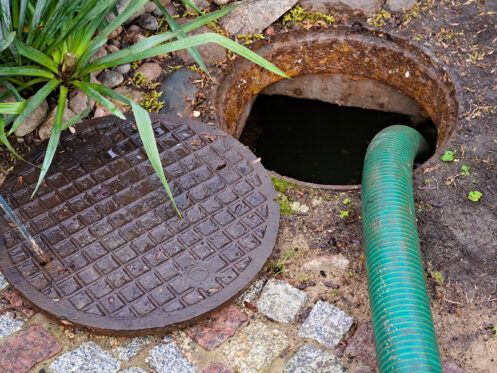Sewage backups are one of every homeowner’s worst nightmares. A backup will make your plumbing unusable until you get it fixed, and it will also result in lots of nasty-smelling, potentially toxic raw sewage flooding parts of your house. Overcoming a backup will always require the help of a professional sewer service, and this article will explain the immediate steps to take whenever your sewer system starts backing up.
Stop Using Your Plumbing
When a sewer backup occurs, sewage will always start flowing out of the lowest drains in the home first. This typically means any floor drains and potentially shower drains in the basement or on the main level if the home has a crawl space or a concrete slab foundation. In cases where there’s a complete blockage of the main sewer line, there is also a chance that sewage can start backing up in the toilets on your home’s bottom floor.
If your sewer starts backing up, you will typically notice the issue quite quickly. This will result in a strong sewage odor wafting throughout parts of your home, especially in your bathrooms. Any time you notice a sewage smell inside, you should immediately check whichever drains are at the lowest level to see if they’ve started backing up.
Any time a sewage backup occurs, it’s essential that you stop using your plumbing immediately. Backups commonly happen all of a sudden when running a dishwasher or washing machine since these units drain quite a bit of water into a home’s sewer system. If a backup occurs when your dishwasher or washing machine is running, shut the appliance off as soon as you realize your sewer is backing up. It’s also important not to flush toilets since this typically leads to the waste you flush down coming back up from your drains. Even using a sink isn’t recommended. The more water you put down the drain, the more your sewer line will back up.
Use a Vacuum to Suck Up the Wastewater
If you have a wet/dry vacuum or shop vac, it’s a good idea to use it to suck up as much of the water and waste as you can. However, you should always wear gloves since the sewage could potentially contain harmful pathogens that can make you sick.
Most sewer services will also clean up the wastewater for you if necessary before cleaning out your sewer line. Nonetheless, you may still want to start the process if possible since you might not always be able to get a sewer service out to your home immediately. Sewage backups can often cause quite a bit of water damage or even lead to a serious mold infestation. The quicker you can get the wastewater cleaned up, the lower the chance of you having to deal with water damage repairs and mold remediation.
Contact an Emergency Sewer Service
You’ll never be able to solve a partially or fully clogged sewer line effectively. A more minor clog could potentially get cleared when more water enters the sewer system. However, there is a much higher chance that the water will lead to your sewage system backing up even more. In many cases where a sewage system starts backing up, it indicates the presence of tree roots or other blockage inside the sewer line. A backup can also indicate that your sewer line is damaged or broken. These issues are why most sewer services will always perform a camera inspection of the sewer line any time a backup occurs. Camera inspections are vital for determining the cause of the backup and what steps are necessary to fix the issue.
Options for Overcoming Backups and Other Sewer Issues
Plumbers often have several different options for overcoming sewage backups and fixing sewer line issues. Which option is best generally depends on the specific cause of the sewer line blockage, the condition of the sewer line, and the type of material the sewer pipe is made of. Sometimes, a minor clog in the part of the sewer line underneath the house or near the foundation can be cleared with a handheld pipe snake.
A more severe clog or a clog further away from your home often requires the plumber to use a sewer machine, also known as a drain auger or rooting machine. This type of machine has an auger that is connected to a long, flexible steel cable. The machine’s motor pushes the auger through the sewer line. As the auger spins, it easily breaks through whatever is clogging the pipe so that all of the water in it can start to drain. The auger head also grabs ahold of lots of solid material in the pipe so that it can be pulled out when the auger is extracted. This method can also be effective for clearing a sewer line clogged by smaller roots, but it may not be effective for larger roots. Trying to cut through larger roots with this type of equipment can also be quite dangerous.
Another possible option in some situations is to hydrojet the sewer line. A hydrojetting machine sprays a powerful blast of water to break up the clog or even slice straight through thicker roots. This method has the advantage of washing the solid materials clogging the pipe out into the sewer main in the street so that they don’t block the pipe closer to your house. The nozzle on a hydrojetting machine also sprays several blasts of water backward at a slight angle, which helps to remove grease, food particles, and other debris to clean the pipe.
Hydro jetting is safe for PVC pipes as long they are in good condition and not damaged. However, it shouldn’t be used on a damaged pipe and also generally isn’t recommended for use on old cast iron or clay sewer lines. This is one reason why having a camera inspection performed first is important.
Most newer homes have one or two sewer cleanouts in the yard that stick just above the ground and connect to the underground sewer line. These cleanouts make it easy for a plumber to access both the part of the line underneath the foundation and the part that extends out from the home into the street.
Older homes often lack cleanouts, which makes clearing the sewer line more difficult. In this case, the plumber will typically need to access the sewer line through a basement floor drain or sometimes by removing a toilet. These options will likely make the job take more time and cost more. It is worth investing in having cleanouts installed if your home doesn’t have them.
If you frequently experience sewer backups, it is often a sign that you must have your sewer line replaced or repaired. This is especially true if you have a cast iron sewer line since this type of pipe develops lots of rust and corrosion inside it over time, which narrows its diameter and makes it much more prone to clogging. Cast iron sewer lines are also much more prone to tree root invasion than other options like PVC.
Since 1951, Childers Air Plumbing & Electric has been helping residents of Beckley and the surrounding areas overcome their plumbing, drain, and sewer issues. We’re available 24/7 so that you can count on us to respond quickly whenever a backup or other emergency occurs. Our team also specializes in heating, air conditioning, and plumbing. Whether you’re dealing with a sewage backup or any other issue with your home, give us a call to get the expert assistance you deserve.

